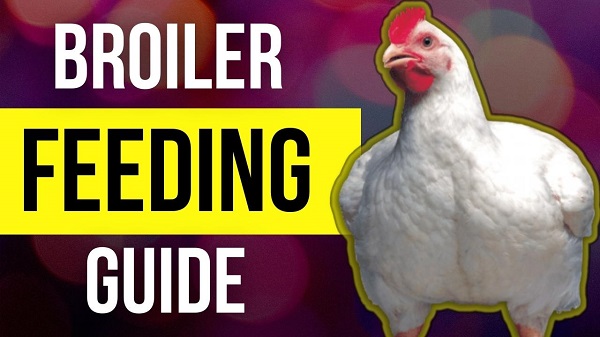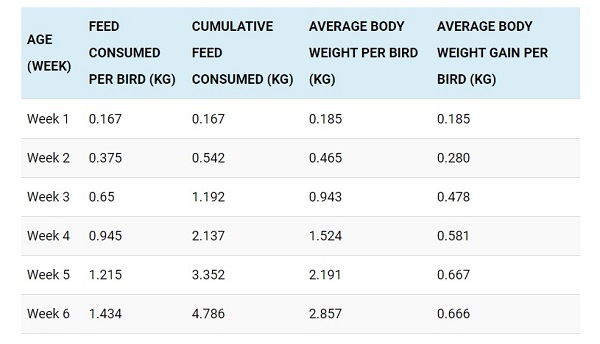

A broiler chicken feeding guide or chart tells you how much feed a broiler chicken needs to grow very well. This is important for two reasons. First, it helps you avoid feed wastage and overfeeding, thus saving money. Second, it helps you plan the quantity of broiler feeds to buy or produce. So, If a farmer knows his farm size and the number of chickens he has, he can determine the cost of feeds required.
The right amount of broiler feed is essential for the health and well-being of chickens. But knowing how much to give your broiler flock isn’t always easy — especially if you’re new to raising chickens.
A broiler feed consumption chart and weight chart help identify the optimal quantity of feeds to give broiler chickens. It also minimizes overfeeding, which can lead to loss of profit and helps farmers find the right balance for their birds. When used properly, this will help ensure your chicken is healthy and growing at a healthy rate.
If you are looking to raise chickens for meat, this article will help you understand the feeding practices associated with raising broiler chickens for meat and a broiler feeding program.
The broiler feeding program is divided into three phases. They are:
The diets or feeds given in these phases are broiler starter diet, broiler grower diet and broiler finisher diet respectively.
It is the initial feed for broiler chickens and it is given to broiler chicks from age 0 day to 10 days. The diet must contain maximum quality proteins and energy sources. In starter feed, the crude protein level is high (21-22% CP) and the metabolizable energy level is low (3000 Kcal/kg ME). Crude fiber content is low (4-5% CF) because chicks can’t digest fiber very well. The starter feed must contain supplements and essential minerals and vitamins.
A quality broiler starter feed supports early growth and physiological development, ensuring that your chickens grow up to be healthy and profitable. A good starter feed should be based on the broiler chicks’ needs and not the cost of making it. Click here for the standard broiler chicken starter nutritional requirements
The broiler grower feed is given to broiler chickens at an early phase of the growth period i.e. 11-25 days of age. In this phase of production, the diet must contain balanced crude protein (19-20% CP) and metabolizable energy (3050 Kcal/kg ME) with fairly low fiber content (7-8% CF). Click here for the standard broiler chicken grower nutritional requirements
The broiler finisher diet is given from age 26 days to 42 days or until slaughter. The broiler finisher diet must contain high energy and lower protein. The metabolizable energy should be 3100-3200 Kcal/kg while the crude protein should be 18-19%. Click here for the standard broiler chicken finisher nutritional requirements

With the broiler feeding and weight chart below, you will be able to answer the following questions related to feeding broilers. These questions include:
50 broilers should consume about 130 kg of feed in a month. That is 5 bags of 25kg feed in a month.
A jumbo broiler can weigh up to 8kg.
A day-old broiler chick weighs 40-45 grams.
This is quite simple. Get a standard poultry feeding guide and check the daily, weekly or monthly feed intake of a chicken. Multiply the cumulative feed consumption by the number of birds.